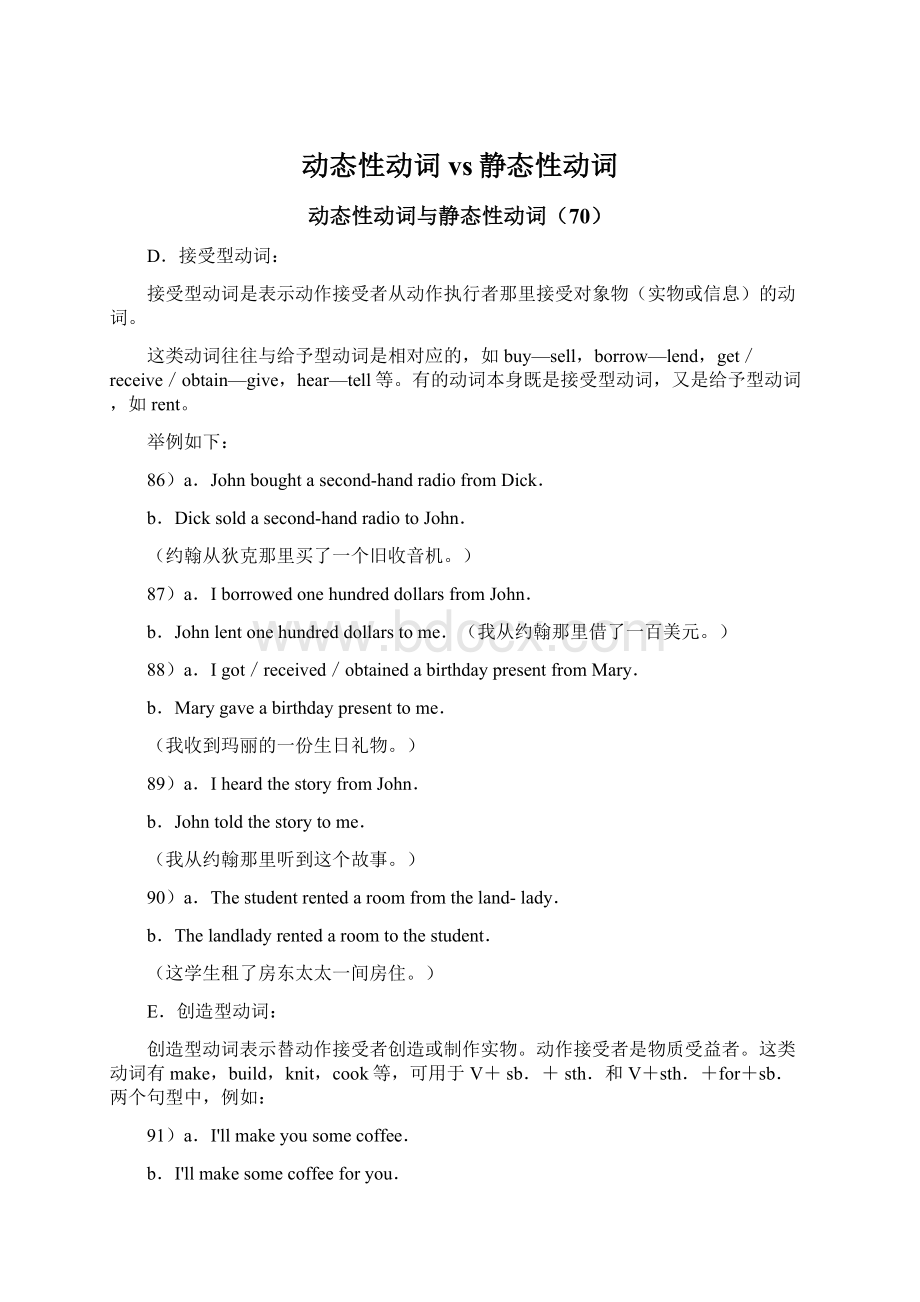动态性动词vs静态性动词.docx
《动态性动词vs静态性动词.docx》由会员分享,可在线阅读,更多相关《动态性动词vs静态性动词.docx(10页珍藏版)》请在冰豆网上搜索。

动态性动词vs静态性动词
动态性动词与静态性动词(70)
D.接受型动词:
接受型动词是表示动作接受者从动作执行者那里接受对象物(实物或信息)的动词。
这类动词往往与给予型动词是相对应的,如buy—sell,borrow—lend,get/receive/obtain—give,hear—tell等。
有的动词本身既是接受型动词,又是给予型动词,如rent。
举例如下:
86)a.Johnboughtasecond-handradiofromDick.
b.Dicksoldasecond-handradiotoJohn.
(约翰从狄克那里买了一个旧收音机。
)
87)a.IborrowedonehundreddollarsfromJohn.
b.Johnlentonehundreddollarstome.(我从约翰那里借了一百美元。
)
88)a.Igot/received/obtainedabirthdaypresentfromMary.
b.Marygaveabirthdaypresenttome.
(我收到玛丽的一份生日礼物。
)
89)a.IheardthestoryfromJohn.
b.Johntoldthestorytome.
(我从约翰那里听到这个故事。
)
90)a.Thestudentrentedaroomfromtheland-lady.
b.Thelandladyrentedaroomtothestudent.
(这学生租了房东太太一间房住。
)
E.创造型动词:
创造型动词表示替动作接受者创造或制作实物。
动作接受者是物质受益者。
这类动词有make,build,knit,cook等,可用于V+sb.+sth.和V+sth.+for+sb.两个句型中,例如:
91)a.I'llmakeyousomecoffee.
b.I'llmakesomecoffeeforyou.
(我给你弄咖啡喝。
)
92)a.Theybuilttherabbitahutch.
b.Theybuiltahutchfortherabbit.
(他们给兔子造了个笼。
)
93)a.Sheknittedhimsomesocks.
b.Sheknittedsomesocksforhim.
(她给他织了几双袜子。
)
94)a.Shecookshimallhismeals.
b.Shecooksallhismealsforhim.
(她一直给他做饭。
)
F.服务型动词:
服务型动词表示动作执行者替动作接受者做事或服务。
动作执行者是服务受益者。
这类动词较多,主要有buy,book,order,find,get,fetch,reach,bring,keep,leave,save,choose,spare,call,pick,pour,doafavour,cash,write,read,sing,play,draw,paint,fry,peel,light,iron,makeup,warmup等,可用于V+sb.+sth.和V+sth.+for+sb.两个句型,例如:
95)a.JohnboughtMaryawatch.
b.JohnboughtawatchforMary.(约翰给玛丽买了一只表。
)
96)a.ShallIbookyouaseat?
b.ShallIbookaseatforyou?
(要我给你订座吗?
)
97)a.Sheorderedherselfanewdress.
b.Sheorderedanewdressforherself.
(她给自己定做了一件新衣服。
)
98)a.Theyfoundmeaflat.
b.Theyfoundaflatforme.
(他们给我找到一套住房。
)
99)a.Pleasegetmetwotickets.
b.Pleasegettwoticketsforme.
(请给我弄两张票。
)
100)a.Ifetchedthemsomewater.
b.Ifetchedsomewaterforthem.
(我给他们打了点水。
)
101)a.Willyoureachmemyhat?
b.Willyoureachmyhatforme?
(你把我的帽子递给我好吗?
)
102)a.Willyoubringmesometea?
b.Willyoubringsometeaforme?
(你给我带点茶叶来好吗?
)
103)a.JohnkeptMaryaseat.
b.JohnkeptaseatforMary.
(约翰给玛丽留了一个座。
)
104)a.MaryleftJohnanoteonhisdesk.
b.MaryleftanoteforJohnonhisdesk.
(玛丽在约翰的书桌上留了张便条。
)
105)a.Thethirstytravellersaidtohiscompanion,“Pleasesavemesomewater.”
b.Thethirstytravellersaidtohiscompanion,“Pleasesavesomewaterforme.
(那口渴的旅行者对他的伙伴说:
“请给我剩一些水。
”)
106)a.Ichosemydaughterabirthdaypresent.
b.Ichoseabirthdaypresentformydaughter.
(我给女儿选了一件生日礼物。
)
107)a.Canyousparemeafewminutes?
b.Canyouspareafewminutesforme?
(你能抽几分钟时间跟我谈谈吗?
)
108)a.I'llcallyouataxi.
b.I'llcallataxiforyou.
(我给你叫辆出租汽车。
)
109)a.JohnpickedMarysomeflowers.
b.JohnpickedsomeflowersforMary.
(约翰给玛丽采了些花。
)
110)a.Letmepouryouadrink.
b.Letmepouradrinkforyou.
(我给你倒杯酒渴。
)
111)a.Willyoudomeafavour?
b.Willyoudoafavourforme?
(你能给我帮个忙吗?
)
112)a.Canyoucashmethischeque?
b.Canyoucashthischequeforme?
(可以给我把这支票兑成现金吗?
)
113)a.Canyouwritetheblindmanaletter?
b.Canyouwritealetterfortheblindman?
(你能替这位盲人写封信吗?
)
114)a.Canyoureadthesickchildafairytale?
b.Canyoureadafairytaleforthesickchild?
(你给这生病的孩子读篇童话好吗?
)
115)a.Pleasesingusasong.
b.Pleasesingasongforus.
(请给我们唱支歌。
)
116)a.Won'tyouplaymeaBeethovensonata?
b.Won'tyouplayaBeethovensonataforme?
(你可不可以给我演奏一首贝多芬的奏鸣曲?
)
117)a.CouldyoudrawmeaPicture?
b.Couldyoudrawapictureforme?
(你给我画幅画好吗?
)
118)a.HepaintedtheoldwomanaPicture.
b.Hepaintedapicturefortheoldwoman.
(他给这老太太画了一幅画。
)
119)a.ShallIfryyouanegg?
b.ShallIfryaneggforyou?
(我给你煎个鸡蛋好吗?
)
120)a.I'llpeelyouanapple.
b.I'llpeelanappleforyou.
(我来给你削个苹果。
)
121)a.Canyoulightmeacigarette?
b.Canyoulightacigaretteforme?
(你给我点枝香烟好吗?
)
122)a.I'llironyouashirt.
b.I'llironashirtforyou.
(我来给你熨衬衣。
)
123)a.ShallIwarmyouupsomesoup?
b.ShallIwarmupsomesoupforyou?
(我给你热一点汤好吗?
)
124)a.We'llmakeyouupabad.
b.We'llmakeupabedforyou.
(我们给你铺个床。
)
125)a.Hemademeupaparcelofbooks.
b.Hemadeupaparcelofbooksforme.
(他给我包好一包书。
)
在使用上述服务型动词时,有些动词后面的对象物前加定冠词或不定冠词,用在两种句型中都是可行的,例如:
126)a.JohnboughtMarya/thewatch.
b.Johnboughta/thewatchforMary.
(约翰给玛丽买了只表。
)
而有些动词后跟对象物,如用定冠词,则只能用于V+sth.+for+sb.句型中,例如:
127)a.I'llpeelyoutheapples.(Impossible)
b.I'llpeeltheapplesforyou.
(我来给你削这些苹果。
)
大量的动词表示“服务”(service)概念时,只能用于V+sth.+for+sb.句型。
这类动词有carry,take,repair,check,open,park,phone,taste,wash,teach等,例如:
128)a.Couldyoucarrymemybag?
(Impossible)
b.Couldyoucarrymybagforme?
(你能替我拿一下包吗?
)
129)a.Couldyoutakemethewine?
(Impossible)
b.Couldyoutakethewineforme?
(您给我拿酒来好吗?
)
130)a.Herepairedmemybicycle.(Impossible)
b.Herepairedmybicycleforme.
(他给我修理了自行车。
)
131)a.Hecheckedmethewiring.(Impossible)
b.Hecheckedthewiringforme.
(他给我检查了线路。
)
132)a.Couldyouopenmethedoor?
(Impossible)
b.Couldyouopenthedoorforme?
(您给我把门打开好吗?
)
133)a.Letmeparkyouthecar.(Impossible)
b.Letmeparkthecarforyou.
(我给你存车吧!
)
134)a.ShallIphoneyouthehospital?
(Impossible)
b.ShallIphonethehospitalforyou?
(要我替你给医院打个电话吗?
)
135)a.Couldyoutastemethewine?
(Impossible)
b.Couldyoutastethewineforme?
(您替我尝一下酒好吗?
)
136)a.Motherwashedherchildrensomeclothes.(Impossible)
b.Motherwashedsomeclothesforherchildren.
(妈妈替孩子们洗衣服。
)
137)a.I'llteachyouyourclass.(Impossible)
b.I'llteachyourclassforyou.
(我替你上你那班的课。
)
G.得失型动词:
得失型动词是表示利益得失的动词,主要有gain,win,get,earn,save,buy,lose,cost/spend等,用于V+sb.+sth.句型。
使用这类动词的特点是:
句子主语不是动作执行者,而是原因、方式、工具等,例如:
138)a.Hishonestygainedhimsuchagoodreputation.
b.Hegainedsuchagoodreputationfor/withhishonesty.
(他的老实厚道使他得到这样的好名声。
)
139)a.HisgreatachievementsinsciencewonhimtheNobelPrize.
b.HewontheNobelPrizefor/withhisgreatachievementsinscience.
(他在科学上的伟大成就,使他荣获诺贝尔奖金。
)
140)a.Thiskindofpublicitywillgetusabadreputation.
b.We'llgetabadreputationthrough/withthiskindofpublicity.
(把事情公诸于众,会使我们声名狼藉。
)
141)a.Apaperroundwon'tearnyoumuchmoney.
b.Youwon'tearnmuchmoneyon/fromapaperround.
(送一圈报纸你不会挣到多少钱。
)
142)a.Hisinventionsavedthefactoryaprodigioussumofmoney.
b.Thefactorysavedaprodigioussumofmoneyby/becauseofhisinvention.
(他的发明,给工厂节省了一笔巨款。
)
143)a.£30,000couldbuyyouaflatinthisdistrict.
b.Youcouldbuyaflatfor£30,000inthisdistrict.
(花三万英镑你可以在这个地区买到一套住房。
)
144)a.Thatmistakelosthimhisjob.
b.Helosthisjobthrough/becauseofthatmistake.
(犯那个错误使他丢了工作。
)
145)a.Yourthoughtlessnesshascostyourpoormothermanysleeplessnights.
b.Yourpoormotherhasspentmanysleep-lessnightsbecauseofyourthoughtlessness.
(你的考虑不周使你可怜的母亲许多夜晚都不能成眠。
)
146)a.Thecoatcosthim30dollars.
b.Hespent30dollarsonthecoat.
(这件衣服花了他三十美元。
)
第六章感觉性动词(SenseVerb)
感觉性动词有四种:
A.感觉能力型动词(SensibilityVerb)B.感觉行为型动词(SenseActVerb)C.感觉表现型动词(SenseExpressionVerb)D.感觉痛苦型动词(SenseSufferVerb)。
我们在前面已逐一进行了讲解,因而此处略去。
第七章遍及性动词(PervasiveVerb)
对象物(objective)和处所(locative)经常出现在同一个句子里。
关系到对象物与处所的动词,包含有使对象物存在于一个地方、或从一个地方运动到另一个地方的意思。
一般分为遍及性动词和非遍及性动词(Non-pervasiveVerb)两种概念。
请看下列两组句子:
1)a.Fishteeminthissea.
(这海里盛产鱼。
)
b.Thisseateemswithfish.
(这海里有各种鱼类。
)
2)a.Snakesarecrawlingonthishill.
(这山上有许多蛇。
)
b.Thishilliscrawlingwithsnakes.
(这个山上蛇类到处出没。
)
在这两组句子里,fish和snakes是存在或运动的对象物,而sea和hill分别是fish和snakes存在或运动的处所。
按照对象物与处所在句子里出现顺序的不同,可将上列句子概括为:
1)a和2)a:
Objective+Locative结构1)b和2)b:
Locative+with+Objective结构一般来说,Objective+Locative结构表明对象物只是存在于一个处所,或在其中运动与转移,而无遍及性的含义。
但是,Locative+with+Objective结构却包含遍及性的意思,即表明整个空间、处所或地方均为对象物所充满或占据。
这类动词大多数具有遍及性和非遍及性两种含义,可用于上面两种结构。
而前置词with是“遍及性”的标志,例如:
3)a.Theyloadedpotatoesontothetruck.
(他们往卡车上装马铃薯。
)
b.Theyloadedthetruckwithpotatoes.
(他们在卡车上装满了马铃薯。
)
接动态性动词与静态性动词(69)但是,如将上列句子改为进行时态,则表明装车动作正在进行,尚未结束,因而其含义均为非遍及性的,没有区别,例如:
4)a.Theywereloadingpotatoesontothetruck.
b.Theywereloadingthetruckwithpotatoes.
再比较下列两组句子:
5)a.Theystrippedthebarkoffthetree.
(他们从这树上剥树皮。
)
b.Theystrippedthetreeofitsbark.
(他们把这棵树的树皮剥光了。
)
5)a具有非遍及性含义,只说明发生过剥树皮的动作,而不表明树皮是否剥光。
5)b则具有遍及性含义,说明树皮全部剥光。
如将句子改为进行时态,则成为:
6)a.Theywerestrippingthebarkoffthetree.
b.Theywerestrippingthetreeofitsbark.
(他们正从树上剥树皮。
)
这两个句子都表明动作正在进行,具有非遍及性的含义,在意思上没有区别。
上述例句中的动词load和strip,既可以用于Objective+Locative结构,表示非遍及性含义;也可以用于Locative+with+Objective结构,表示遍及性含义。
这类动词的数量是相当不少的。
但是有的动词,如put,lay,pour,是非遍及性的,只能用于Objective+Locative结构,例如:
7)a.Theyputpotatoesontothetruck.
b.Theyputthetruckwithpotatoes.(Impossible)
(他们往卡车上装马铃薯。
)
8)a.Shelaidoldnewspapersonthefloor.
b.Shelaidthefloorwitholdnewspaper.(Impossible)
(她在地板上铺上旧报纸。
)
9)a.Shepouredwineintomyglass.
b.Shepouredmyglasswithwine.(Impossible)
(她往我的杯子里斟酒。
)
特定的数量概念是与非遍及性概念相关的,例如:
10)a.Theyloadedasackofpotatoesontothetruck.
b.Theyloadedthetruckwithasackofpotatoes.(Impossible)
(他们把一口袋马铃薯搬上卡车。
)
asackofpotatoes表示一个特定的数量概念,不可能装满一大卡车,与遍及性的意思不相容。
因此,10)b这个句子不能成立。
另有些动词,如overload,fill,cover,只包含遍及性的意思,因而只能用于Locative+with+Objective结构,例如:
11)a.Theyoverloadedpotatoesontothetruck.(Impossible)
b.Theyoverloadedthetruckwithpotatoes.
(他们在卡车上装马铃薯,满得都要掉了。
)
12)a.Shefilledwineintomyglass.(Impossible)
b.Shefilledmyglasswithwine.
(她把我的杯子斟满了酒。
)
13)a.Shecoveredoldnewspapersonthefloor.(Impossible.)
b.Shecoveredthefloorwitholdnews-papers.
(她在地板上铺满了旧报纸。
)
表明对象物与处所关系的动词,根据其不同含义,大致可以分为四类:
A.放入型动词(Put-in”Verb)
B.取走型动词(“Take-away”Verb)
C.传播型动词(“Spread”Verb)
D.占据型动词(“Occupy”verb)